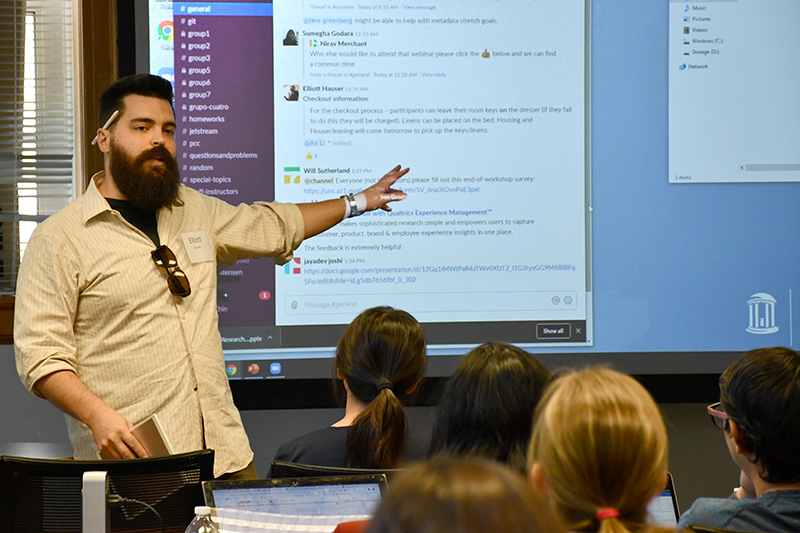PhD candidate Elliott Hauser wins dissertation research and best paper awards
Elliott Hauser, doctoral candidate at the UNC School of Information and Library Science (SILS), has been selected as the recipient of the 2019 Litwin Books Award for Ongoing Dissertation Research in the Philosophy of Information.

Cyber Carpentry Workshop, hosted at SILS.
In addition, Hauser and Joseph T. Tennis, Associate Professor and Associate Dean for Faculty Affairs at the University of Washington iSchool, won the Best Paper Award at the North American Symposium on Knowledge Organization conference (NASKO 2019) in June. The paper, titled “Episemantics: Aboutness as Aroundness,” will be revised for publication in the journal Knowledge Organization later this year.
Hauser also recently received the SIG HFIS (History & Foundations of Information Science) doctoral travel award to go to Melbourne for ASIS&T 2019 in October.
In a release announcing the dissertation award, Litwin Books shared a quote from the selection committee, commending Hauser’s research and its potential significance.
“Hauser’s dissertation work is a fascinating project on how information systems construct truth, and what truth means in systems, like credit scoring and the Do Not Fly list,” said the committee. “This is a timely issue as our ‘post-truth era’ and ‘algorithm society’ demand new investigations of truth. The work is well-informed and rigorous, and these complicated issues are explained with welcome clarity.”
Hauser’s research focuses on how information systems are used to produce certainty and thereby shape parts of social reality. He studies this phenomenon by applying philosophical and theoretical methods to position specific information systems within their social contexts.
“My theoretical work in information studies helps me contribute to a broad range of interrelated fields such as information ethics, algorithm studies, and knowledge organization,” Hauser said. “Ultimately, I aim to help us better understand the nature of information systems, how they condition social reality, and how we might intervene to make social reality more just.”
Inspired by his teaching experience at SILS, where he found his students needed a simpler, more powerful Python programming environment, Hauser took a leave of absence from his doctoral studies to co-found Trinket.io, an online coding platform designed for education. Trinket is now used by hundreds of thousands in classrooms around the world, and Hauser has used it in his teaching at SILS since his return.
Prior to entering the doctoral program, Hauser completed an MSIS from SILS, during which time he worked as a technology consultant with Accenture. Before that, he worked for several years in real estate development and the financial services industry, where he learned that every organization’s potential is defined by the information systems they have, and how they use them.
